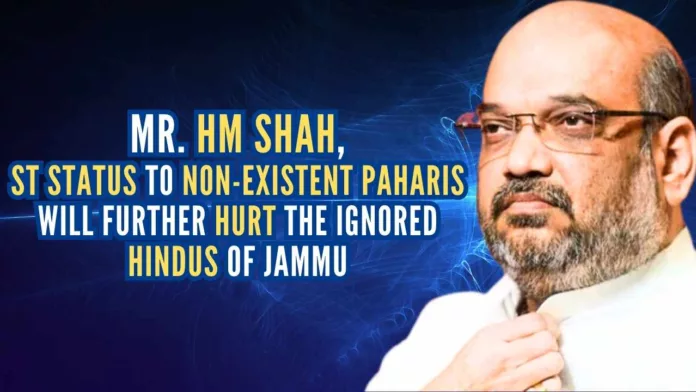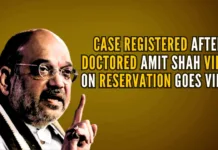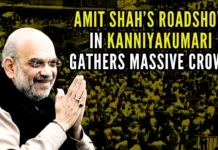
Pahari Tribe in the ST list of J&K
On July 26, the Narendra Modi government introduced four bills in Lok Sabha pertaining to J&K. One of the four bills was introduced by Union Tribal Affairs Minister Arjun Munda. It proposed the inclusion of (non-existent) “Pahari ethnic group” and Gadda Brahmin, Koli, and Paddari Tribes in the list of Scheduled Tribes (STs) by amending the Constitution (J&K) Scheduled Tribes Order, 1989.
Introducing the bill, the minister said: “The administration of the Union Territory of J&K has requested to include the communities of Gadda Brahmin, Koli, Paddari tribe and Pahari ethnic group in the list of Scheduled Tribes (STs) in respect of the Union Territory of J&K”. “On the basis of recommendation of the administration of the UT of J&K and after consultation with the Registrar General of India and the National Commission for Scheduled Tribes, it is proposed to amend the Constitution (J&K) Scheduled Tribes Order, 1989,” his statement also said. Accordingly, it said, the Constitution (J&K) Scheduled Tribes Order (Amendment) Bill, 2023 proposed to amend the Constitution (J&K) Scheduled Tribes Order, 1989, to include the communities of Gadda Brahmin, Koli, Paddari tribe, and Pahari ethnic group in the list of STs in respect of UT of J&K” [1].
A day before (July 25), a report said: “Ten percent reservation granted to Gujjars and Bakerwals (all Sunni Muslims) in government jobs and educational institutions in J&K will not be disturbed while Pahari kabila and others will get a separate reservation and both will be treated as ST. This assurance is reported to have been given by Union Home Minister Amit Shah to two separate delegations of Paharis and Gujjar and Bakerwals who met him in New Delhi tonight (July 25) in the presence of Lt Governor Manoj Sinha and BJP national general secretary, incharge J&K affairs, Tarun Chug…Insiders said Gujjars and Bakerwals, Gaddis (all Hindus), Sippis (all Hindus), Sheenas (all Muslims), and all those who are already entitled to reservation under the ST category, will continue to get 10 percent reservation in educational institutions, jobs, etc in J&K while Pahari Kabila, Paddari tribe, Gadda tribal Brahmans and Koli tribe community will get a separate reservation, the percentage of which will be decided by both Centre and UT Government in consultation with each other…However, all of them will be treated as STs which will make them eligible for political reservation (in J&K Assembly and Lok Sabha)…”[2].
Ignoring important facts
It appears that the Narendra Modi government has overlooked six basic and important facts. One is that there exists no such tribe in J&K, nay in the entire world, as Pahari. Paharis are those people who inhabit hilly and mountainous areas. No work on anthropology anywhere in the world has termed those inhabiting the mountainous and hilly areas as a Pahari tribe.
The other is that the Pathowari-speaking people inhabiting the Poonch-Rajouri belt in Jammu province and Kupwara-Handwara-Baramulla belt in Kashmir now being termed as Pahari Kabila started demanding ST status only after April 1991, when the Chandra Shekhar government granted ST status to Gujjars and Bakerwals, Gaddis, Sippis and Sheenas. Gujjars and Bakerwals and Pathowari-speaking people inhabit the same area in Jammu province and Kashmir region.
The third fact that the Modi government has not taken into consideration is that neither the P V Narasimha Rao government nor any other Central government, including the A B Vajpayee-led NDA government and Manmohan Singh-led UPA government, ever considered the demand of the Pathowari-speaking people seeking ST status.
The fourth fact is that none of the commissions and committees appointed by the J&K government from time to time, including the Gajendragadkar Commission, Sikri Commission, Anand Commission, and Wazir Commission, and not one working group appointed by PM Manmohan Singh talked about the ST status to the Pathowari-speaking people. Even the report of Manmohan Singh-appointed interlocutors – Dilip Padgaonkar, Radha Kumar, and M M Ansari – did not recommend ST status for the Pathowari-speaking people, almost 90 Muslims (all Sunnis).
Those in the Modi government who came out with the bill seeking ST status for the Pathowari-speaking people have utterly failed to appreciate the fact that the entire UT of J&K, barring the Kashmir Valley proper, and small plain areas in Kathua, Samba, and Jammu districts in Jammu province, is hilly and mountainous. The bulk of the area in Kathua, Samba, and Jammu districts is mountainous. Similarly, the whole area of Ramban, Doda, Kishtwar, Udhampur, Reasi, Poonch, and Rajouri districts in Jammu province is highly mountainous. Likewise, almost 85 percent area of the Kashmir region is also highly mountainous. Indeed, the policy planners in the Modi government have made unjust and invidious distinctions between the mountainous area in the UT of J&K. And, it is a matter of grave concern.
Last but not least, the policy planners in the Modi government did not take note of the role certain Pathowari-speaking people, including army personnel in Maharaja Hari Singh’s forces, played before and after October 20, 1947. It was the Pathowari-speaking army personnel and certain other influential Pathowari-speaking Muslims who revolted against the Maharaja and helped Pakistan loot, plunder, and annex areas, now called PoJK, and torture, convert, abduct, and expel Hindus and Sikhs from the Muzaffrabad-Poonch-Rajori belt. Those who quit POJK in 1947-1948 to save their lives, dignity, culture, and religion are called displaced persons. Almost 95 percent of such displaced persons have been living in Jammu since their migration/ expulsion.
Hurting Hindus
Even a superficial look at the bill and the newspaper report would leave none in any doubt whatsoever that the bill if adopted by the Parliament, would further hurt the already rather suffering general category Hindus, who constitute almost 75 percent of the Hindu population in Jammu province.
It needs to be underlined that the Delimitation Commission, which was constituted under the J&K Reorganisation Act, 2019, has divided the UT of J&K into 90 territorial constituencies — 47 in Kashmir (all 100 percent Muslim) and 43 in Jammu (10-12 Muslim dominated and 30-32 Hindu dominated). These 90 seats include seven seats reserved for Scheduled Castes (all in Jammu province) and 10 percent (nine seats) for the ST communities. Six of the nine seats reserved for the STs are in Jammu province – Rajouri, Thanna Mandi, and Budhal in Rajouri district, Mendhar and Surankot in Poonch district, and Gool Arnas in Reasi district. The remaining three seats are in Kashmir and these are Kokar Nag Larnoo, Gurez, and Kangan.
Believe it or not, but it is a fact that the Delimitation Commission has reserved all nine seats for Gujjars and Bakerwals and not one seat for the Gadda Brahmin, Gaddi, and Sippi tribes – all Hindu. This was how the Delimitation Commission reserved seats for the STs.
The questions to be asked are: Will the Union government also reserve ten percent seats for the non-existent Pahari Kabila? Will it set up another Delimitation Commission to delimit de novo the already delimited constituencies and create more seats to accommodate this non-existent Pahari Kabila? Will the Union government reserve seats for them out of the 23-24 general constituencies in Jammu province (all Hindu-majority)? Or, will it reserve certain seats like it has proposed three seats for the persecuted and hounded-out Kashmiri Hindus and Hindu-Sikh refugees from PoJK in the J&K Reorganisation (Amendment) Bill, 2023 – seats which will be filled through the process of nomination?
Withdrawal of bill imperative
Will the Modi government and Home Minister Amit Shah look all these facts in the face and ask the Tribal Affairs Minister to withdraw the bill on STs? They must. Any failure on their part to do so would simply mean that they are out to further hurt the already suffering general category Hindus in the already grossly discriminated Jammu province. These Hindus plus the Scheduled Castes have been returning BJP candidates from Jammu province to the Lok Sabha since the Vajpayee times.
Note:
1. Text in Blue points to additional data on the topic.
2. The views expressed here are those of the author and do not necessarily represent or reflect the views of PGurus.
Reference:
[1] 4 Bills restructuring reservation; LA representation in J&K introduced in Lok Sabha – Jul 27, 2023, Greater Kashmir
[2] Gujjar, Bakerwals’ reservation stays intact; Paharis get separate quota; both will be ST – Jul 26, 2023, Daily Excelsior
PGurus is now on Telegram. Click here to join our channel and stay updated with all the latest news and views
For all the latest updates, download PGurus App.










